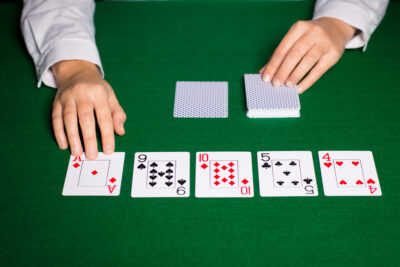Position in Poker
Players often think that poker is easy to play, but difficult to master. They think it’s just too complicated, that you need to be some sort of genius to reach the ‘next level’ play. Their (wrong) solution? Taking a gung-ho approach to their gambling, going with their gut, or following a strategy with no real basis.
But playing poker without a strategy, without thinking about your position, is a big mistake. And potentially a very expensive one.
Even though many people think poker is very daunting, ArabianBetting explains that anyone wanting to play Texas Hold’em should know it’s actually a very simple variation, and can be learned by following a few simple tips. For example, as you can read on the website, there are two ways to win a pot: by having the best hand, or by making all other players fold. However, and what is especially emphasized, to win and make money, you also need to understand betting odds, types of bets, hand values, player positions, as well as to set proper goals. So to say, Poker is layered, yes, but ultimately something you can master with the right education, practice, and time investment.
In this article, I’ll explain why your position matters.
What is ‘Playing in Position’?
So for those of you who don’t quite know what I mean by position, let’s go over the basics. Position in poker essentially refers to where you’re sitting at a poker table, it’s that simple. Your individual position is always relative to the dealer, as it determines when it’s your turn in the game.
Should a player have what’s called “position on you”, it means they are to your left, i.e., their turn is after yours. The dealer moves from player to player to ensure everyone is given equal time at each slot.
The in-position seat is so powerful that it’s nicknamed the “Jesus Seat”. That should tell you just how important it is. Playing in position means you’re the last to move, which gives you a huge advantage, as you’re able to react to other players. For example, if the players don’t want to bet their respective hands, you have the intel that something is up.
Playing in position gives you the power to decide what the size of the bet is. You can also make a call on whether you want to give the free card. Or not. You are the one who is in control. Playing in position is preferable no matter what poker variant you’re playing, but it’s especially important in no-limit hold’em, as the player in position has the greatest control over the pot size.
How to Manage Playing Out of Position
Compare that to someone who is not playing in position. They’re playing with absolutely no inside knowledge, no advantage, no angle. But that doesn’t mean there’s no strategy you can employ.
Playing “under the gun”, or first after the dealer, is a precarious position and should be played very tight. This means limiting your play to very solid hands only. Play a conservative game, be selective. Just don’t let that strategy bleed into your other positions; some players struggle with transitioning their passive game once they’ve left the out of position slot. Another thing you can do is to place what some players call “feelers”. This is a tactical play, designed to figure out how your opponent reacts to you. Just don’t overdo it. Also, be very careful about decent hands like K and 10, which rank above most starting hands, but can get you into trouble post-flop.
Think About Your Opponents
There is one famous quote by Mary Hunter Austin found at BrainyQuotes: “People would be surprised to know how much I learned about prayer from playing poker.”
Therefore, if you join a table where you know someone is a particularly aggressive or weak player, always try and grab the seat to their left. This will ensure you maximize the time spent in position versus that player.
Sure, it’s a little cruel to pinpoint a friend as a weak player and to take advantage of the fact. But if you’re playing for serious money, it’s all about the tight margins.
Conclusion: Position is Key to a Profitable Bankroll
If there’s one message I want you to leave with, it’s the crucial point that your position is key to the decision-making process. Ignoring your position will stack the odds further against you, and as any professional poker player knows, winning is all about the smallest of margins.
Sure, ignore your position, and you may win a hand. Or two. But in the long term, you’ll fall to the disadvantages posed by playing without position in mind. If your goal is to have a good time with your buddies, fair enough. But if you want to make money, position matters.




